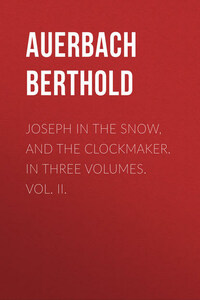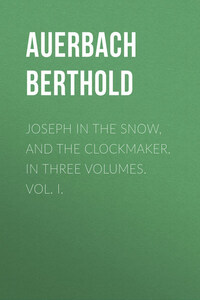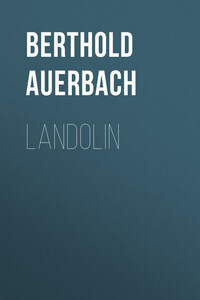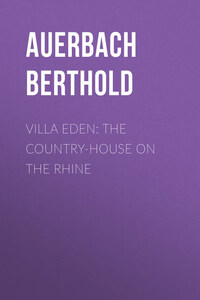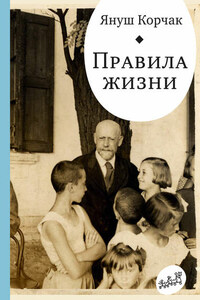There is a house on the declivity of a hill, on which the morning sun long lingers, and the eyes of those who gaze on this house sparkle with pleasure, for they augur from that glance that its inhabitants are happy. They are so; but their happiness is of a peculiar nature, for they have striven long and hard, before they at last acquired it. They have stood on the very threshold of death, though eventually restored to the living.
The wife appears at the door – her face is fair, pretty, and youthful, but her hair is white as snow – she smiles at an old woman who is working in the garden, and calls to the children to be less noisy; a thriving young fir plantation forms a background to the house.
"Come in, Franzl, and you children also; 'Wilhelm is to set off to-day on his travels," says the young woman with white hair.
The old woman comes up to her slowly; her figure is bent, and she is already taking hold of her apron, in order to dry the tears that are fast rising to her eyes. In a short time the husband comes out of the house with a young lad, who has a knapsack on his shoulders.
"Wilhelm," says the father, "take leave of your mother here, and be sure you conduct yourself so that whatever you do, you may be able to think: – 'My father and mother may know this;' and then, please God! you will, one day, once more cross this threshold in peace."
The mother embraces the lad, and says, sobbing: —
"I have nothing more to say; your father has said all; but if you find a plant of Edelweiss on the Swiss mountains bring it home for me."
The youth walks on, and his brothers and sisters call after him, "Good bye, Wilhelm!" While the father, turning to his wife, says: – "Annette, I only mean to go as far as the boundary with Wilhelm and Lorenz. Pilgrim will go on with them to their first night's quarters. I shall return soon."
"Quite right, but don't hurry back, and above all, don't take the parting so to heart; and tell Lisle Faller, as you pass, that I wish her mother and her to dine here."
The father goes forward with his son, and the mother says to the old woman: —
"It is a great comfort to me, that young Faller goes with Wilhelm on his travels."
We can relate why the young mother with the white hair, begged her son to bring her home a plant of Edelweiss from his travels.
It is a hard, painful, almost cruel story, but the sun of love beams brightly, at last, through the clouds.
"She was an excellent woman."
"Few like her left."
"She was one of the good old-fashioned sort."
"Come when you would, she was always ready to bestow help and comfort."
"What trials she had gone through! she had buried four children and her husband, and yet she was always kind and cheerful."
"Lenz will miss her sadly; he will discover now what a mother he had."
"Oh, no! he knew that well enough during her life, and always strove to please her."
"He must marry soon, now."
"He can choose whoever he likes; any house he knocks at will gladly throw open the door to him, he is so good and steady."
"Besides, he must have a considerable sum of money."
"And he is heir to his rich uncle, Petrowitsch."
"How well the Choral Society sung at the funeral today! it quite went to the heart."
"How much it must have touched poor Lenz! he usually sings with them, and he has the best voice of them all."
"Very true – he did not shed a tear during the funeral service, but when his companions were singing, he cried and sobbed as if his heart would break."
"This is the first funeral that Petrowitsch did not leave the village to avoid: indeed, it would have been too bad if he had not shown this last mark of respect to his sister-in-law."
It was thus the men were conversing while going along, through the valley, and up the hill. They were all in black, for they were coming from a funeral. In the churchyard below, near which a few houses are clustered – the Inn of the Golden Lion parading itself in the centre – they had just buried the widow of the clockmaker, Lenz of the Morgenhalde, and all had a good word to say of the deceased, for each individual felt they had lost a kind friend when the good woman quitted the world.
The mourners seemed deeply affected, and sorrow was evident on every face, for just as some fresh grief revives former ones, so those who had just seen the earth scattered on the newly dug grave, had taken the opportunity of visiting the graves of their own relations, shedding tears over their silent resting place, and uttering fervent prayers.
We are in the district inhabited by the clockmakers of the Black Forest, a wooded and mountainous tract of country, where its streams on one side flow towards the Rhine, and on the other to the Donau, which has its source not far from this. The men have a pious, composed air; the number of women considerably exceeds that of the men, for a vast proportion of the latter are dispersed through the world, pursuing their traffic in clocks. Those who stay at home are generally pale, bearing traces of their sedentary occupation; the women, on the contrary, who work in the fields, are fresh coloured, and have a quaint, original appearance from the broad black ribbons tied under their chins, according to the fashion of the country.
